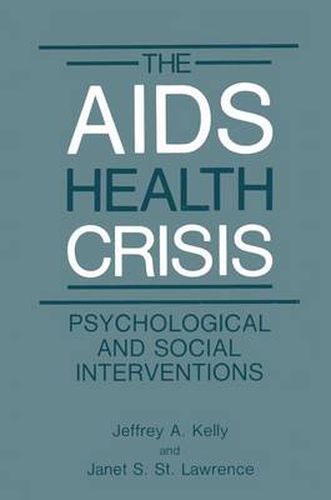Readings Newsletter
Become a Readings Member to make your shopping experience even easier.
Sign in or sign up for free!
You’re not far away from qualifying for FREE standard shipping within Australia
You’ve qualified for FREE standard shipping within Australia
The cart is loading…






Acquired immune deficiency syndrome (AIDS) poses a health threat unparalleled in modem times. Identified just a few years ago, AIDS and the human inunlmodeficiency virus (IDV) responsible for it affect millions of persons worldwide. AIDS has already become the leading cause of death among persons under 40 in some large American cities. From the beginning. it has been evident that AIDS carries unique psychological and social ramifications. In spite of its lethality, new cases of HIV infection are preventable if individuals can be assisted to make behavior changes to lessen or eliminate viral transmission. To the extent that we can develop effective primary prevention interventions, it will be possible to keep larger numbers of people from becoming infected with the mv virus. Psychological and social risk behavior change interventions, whether at the level of individual clients, groups, or entire communities, can playa key role-in fact, the only available role-in disease prevention. Patients with any life-threatening illness have psychological, social, and support needs. However, these needs are more pronounced and, often, less easily addressed for persons affected by AIDS. People in good clinical health but with HIV infection face years of worry concerning whether they will develop AIDS. Nearly 2 million Americans are currently in this precarious position; by 1991, 50 to 100 million persons worldwide are expected to share the same uncertainty.
$9.00 standard shipping within Australia
FREE standard shipping within Australia for orders over $100.00
Express & International shipping calculated at checkout
Acquired immune deficiency syndrome (AIDS) poses a health threat unparalleled in modem times. Identified just a few years ago, AIDS and the human inunlmodeficiency virus (IDV) responsible for it affect millions of persons worldwide. AIDS has already become the leading cause of death among persons under 40 in some large American cities. From the beginning. it has been evident that AIDS carries unique psychological and social ramifications. In spite of its lethality, new cases of HIV infection are preventable if individuals can be assisted to make behavior changes to lessen or eliminate viral transmission. To the extent that we can develop effective primary prevention interventions, it will be possible to keep larger numbers of people from becoming infected with the mv virus. Psychological and social risk behavior change interventions, whether at the level of individual clients, groups, or entire communities, can playa key role-in fact, the only available role-in disease prevention. Patients with any life-threatening illness have psychological, social, and support needs. However, these needs are more pronounced and, often, less easily addressed for persons affected by AIDS. People in good clinical health but with HIV infection face years of worry concerning whether they will develop AIDS. Nearly 2 million Americans are currently in this precarious position; by 1991, 50 to 100 million persons worldwide are expected to share the same uncertainty.